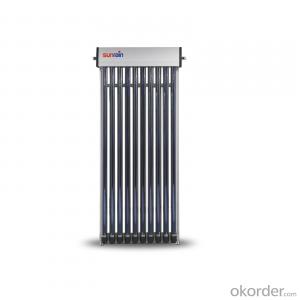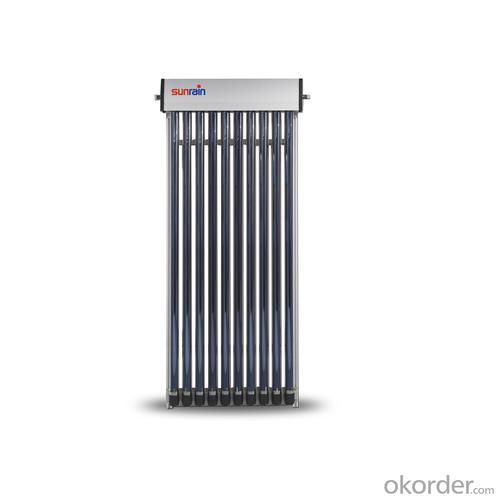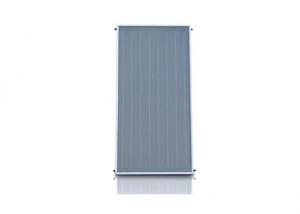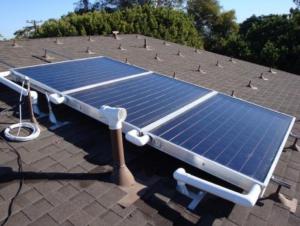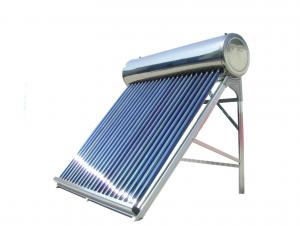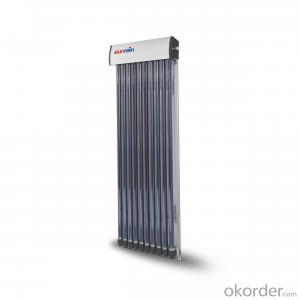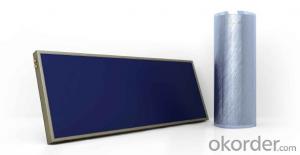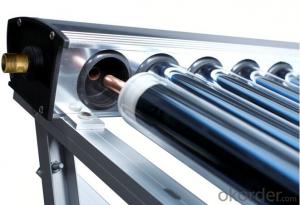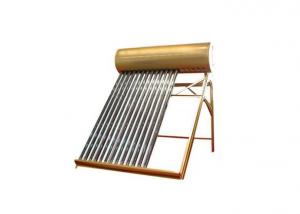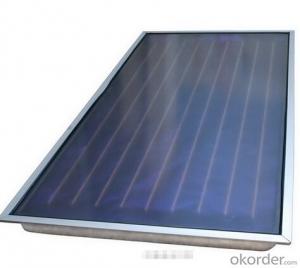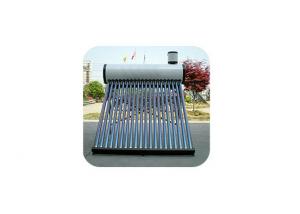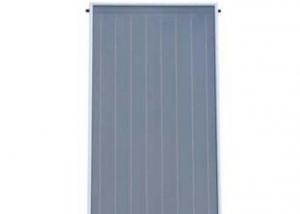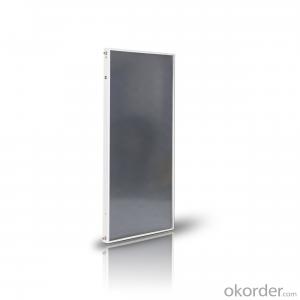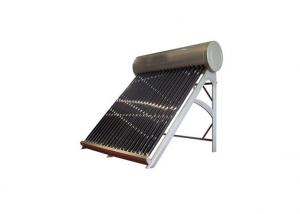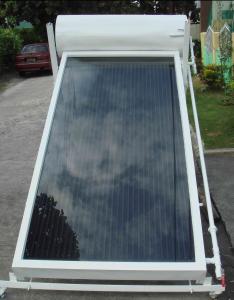Small Solar Water Heater Heat Pipe Collector R5
- Loading Port:
- China Main Port
- Payment Terms:
- TT OR LC
- Min Order Qty:
- -
- Supply Capability:
- -
OKorder Service Pledge
OKorder Financial Service
You Might Also Like
* Heat pipe - offer low maintenance
* No water in the vacuum tubes, no freezing problem in winter, can be used in cold area. One broken tube will not affect the function of the system.
* 3 years warranty, 20+ years lifespan
* Market leading efficiency/output
* Triple layer selective absorber coating, absorption coefficient >94%
* Evacuated tube outer tube thickness >1.8mm
* 14mm high conductivity heat pipe condenser, Nick-coated condenser surface.
* Aluminum frame, strong structure, light weight.
* High and constant pressure of polyurethane foaming technology ensure the outstanding insulation quality.
- Q: Can a solar water heater be used in areas with limited propane availability?
- Yes, a solar water heater can be used in areas with limited propane availability as it operates solely on solar energy to heat water, eliminating the need for propane or any other fuel source.
- Q: Can a solar water heater be used to heat domestic hot water as well as space heating?
- Certainly! A solar water heater has the capability to heat both domestic hot water and space heating. There are two primary types of solar water heaters that can serve this purpose: active solar water heaters and passive solar water heaters. Active solar water heaters employ pumps and controls to circulate water or heat transfer fluid throughout the system. These systems can be designed not only to heat domestic hot water, but also to transfer the heated fluid to a heat exchanger or radiant flooring system for space heating. Consequently, the heated fluid can be utilized to warm the air in the space or provide radiant heat through the floors. On the other hand, passive solar water heaters rely on natural convection and gravity to circulate the water or heat transfer fluid. Typically, these systems are used for domestic hot water heating, but they can also be integrated with space heating systems. As an example, a passive solar water heater can be connected to a radiant flooring system, allowing the heated fluid to warm the floors and provide space heating. In both instances, the solar water heater represents an economical and sustainable solution for supplying both domestic hot water and space heating. By harnessing the sun's energy, these systems can significantly decrease reliance on conventional heating methods, leading to reduced energy bills and carbon footprints.
- Q: Can a solar water heater be used in areas with limited access to skilled technicians for maintenance or repairs?
- Yes, a solar water heater can be used in areas with limited access to skilled technicians for maintenance or repairs. Solar water heaters are generally designed with simplicity and durability in mind, making them easy to operate and maintain. They have fewer moving parts compared to conventional water heaters, reducing the chances of breakdowns or malfunctions. Additionally, solar water heaters are built to withstand harsh weather conditions, making them suitable for remote or rural areas with limited resources. Routine maintenance requirements are often minimal, primarily consisting of cleaning the solar panels and checking the fluid levels. These tasks can usually be performed by the end-user with basic instructions provided by the manufacturer. Furthermore, many manufacturers offer user-friendly manuals and online resources to assist individuals in troubleshooting common issues or conducting minor repairs. In case of major repairs or technical problems, the manufacturer can often provide remote support or guidance through phone or email communications. Overall, while having limited access to skilled technicians may pose some challenges, solar water heaters are designed to be low-maintenance and user-friendly, making them suitable for use in areas with limited technical support.
- Q: How does the color of the solar panels affect the efficiency of a solar water heater?
- The color of solar panels does not significantly affect the efficiency of a solar water heater. The efficiency mainly depends on factors such as the design, size, and orientation of the panels, as well as the amount of sunlight received. The color of the panels may slightly influence their heat absorption capabilities, but it does not play a major role in overall efficiency.
- Q: Are there any warranties available for solar water heaters?
- Solar water heaters do have warranties that are readily available. Various manufacturers provide warranties for their products, usually safeguarding against any faults in materials or craftsmanship. The duration and conditions of these warranties differ, contingent upon the manufacturer and the particular model of the solar water heater. It is crucial to thoroughly read and comprehend the terms and conditions of the warranty before buying a solar water heater. Moreover, certain manufacturers might present extended warranties or the choice to acquire supplementary warranty coverage for an extra charge.
- Q: Are there any health benefits associated with using a solar water heater?
- Yes, there are several health benefits associated with using a solar water heater. One of the primary benefits is the reduction in exposure to harmful chemicals and toxins found in traditional water heating systems. Solar water heaters do not require the use of fossil fuels, such as natural gas or oil, which can release harmful emissions during the heating process. By utilizing clean and renewable solar energy, the water heated by solar water heaters is free from these pollutants, resulting in improved indoor air quality and reduced risk of respiratory problems. Additionally, solar water heaters can help to prevent the growth of harmful bacteria and microorganisms in the water supply. Traditional water heaters often store hot water in tanks, providing a suitable environment for the growth of Legionella bacteria and other pathogens. Solar water heaters, on the other hand, heat water on-demand, minimizing the risk of bacterial contamination and reducing the chances of waterborne diseases. Moreover, using a solar water heater can have positive effects on skin health. Traditional water heating systems often rely on hard water, which contains a high concentration of minerals like calcium and magnesium. These minerals can dry out the skin and hair, leading to issues like dryness, itchiness, and dandruff. Solar water heaters, however, can be equipped with water softening systems that remove these minerals, resulting in softer and healthier skin and hair. Finally, the use of solar water heaters can contribute to overall mental and emotional well-being. By reducing reliance on non-renewable energy sources, individuals can feel a sense of satisfaction and pride in their contribution to a healthier and more sustainable environment. This positive mindset can have a cascading effect on mental health, improving mood, reducing stress, and promoting overall well-being. In conclusion, the use of solar water heaters offers a range of health benefits, including reduced exposure to harmful chemicals, prevention of bacterial contamination, improved skin health, and positive impacts on mental well-being. By harnessing the power of the sun, solar water heaters provide a sustainable and health-conscious solution for heating water.
- Q: Can a solar water heater be used with an existing water heating system?
- Yes, a solar water heater can be used with an existing water heating system. It can work in conjunction with the existing system to supplement the heating process, reducing energy consumption and costs.
- Q: Are there any financial incentives for selling excess solar-heated water back to the grid?
- Financial incentives are available for selling excess solar-heated water back to the grid. Numerous countries and regions have net metering programs that enable homeowners and businesses with solar water heating systems to earn credits or payments for the surplus energy they produce and supply to the grid. A bi-directional meter measures the surplus energy, tracking the electricity generated and exported to the grid. These credits can be used to offset future energy consumption or sold back to the utility company at a predetermined rate. Furthermore, certain governments offer feed-in tariffs (FITs) or feed-in premiums, guaranteeing a fixed payment for each kilowatt-hour of solar energy generated and fed back to the grid. These financial incentives not only offset the initial investment in solar water heating systems but also promote the adoption of renewable energy sources and contribute to overall sustainability goals. It is essential to consult local utility companies, government agencies, or renewable energy associations for specific details and eligibility criteria regarding the financial incentives for selling excess solar-heated water back to the grid.
- Q: How does the warranty of a solar water heater compare to a traditional water heating system?
- The warranty of a solar water heater typically tends to be longer and more comprehensive compared to that of a traditional water heating system. This is because solar water heaters are built to be durable and reliable, with fewer moving parts and less maintenance required. Additionally, solar water heaters often come with extended warranties on specific components such as the solar collectors and storage tanks, providing greater protection and peace of mind to the consumer.
- Q: What are the installation requirements for a solar water heater's expansion tank?
- The installation requirements for a solar water heater's expansion tank may vary depending on the specific model and manufacturer, but generally, it should be installed in a location where it can be easily accessed for maintenance and inspection. It should be mounted vertically and connected to the solar water heater's piping system, preferably near the outlet or at the highest point of the system. The tank should be properly sized to accommodate the expansion of the heated water and have a suitable pressure rating to match the system's requirements. It is also important to follow the manufacturer's instructions and any local building codes or regulations when installing the expansion tank.
Send your message to us
Small Solar Water Heater Heat Pipe Collector R5
- Loading Port:
- China Main Port
- Payment Terms:
- TT OR LC
- Min Order Qty:
- -
- Supply Capability:
- -
OKorder Service Pledge
OKorder Financial Service
Similar products
Hot products
Hot Searches
Related keywords
